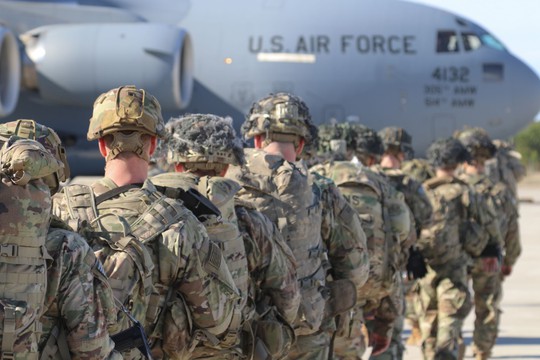Photo: CNBC
The US Commission on the National Defense Strategy, a congressionally mandated group with members handpicked by bipartisan lawmakers, has determined that Washington is unprepared to face a possible global war and must significantly overhaul its national defense strategy.
In its 132-page report, published by the RAND Corporation, the commission recommends Washington boost its nearly $1 trillion yearly defense budget to “Cold War-era levels” and urges the government to “foster an alliance that could lead to global war.”
“The United States must spend more effectively and efficiently to build the future force, not perpetuate the existing one. Additional resources will be necessary. Congress should pass a supplemental appropriation to begin a multiyear investment in the national security innovation and industrial base,” the report says.
Increasing Washington’s defense spending would allegedly address recruiting shortcomings, a “grossly inadequate” industrial base, and “underfunded cyber and space domains.”
Citing global “threats,” such as China, Russia, North Korea, and Iran, the commission endorsed its 2018 recommendation to increase base defense spending by 3 to 5 percent annually above inflation. US defense spending oscillated between 4.9 and 16.9 percent during the Cold War.
The congressional report was published just a few months after the Pentagon failed its independent annual audit for the sixth year in a row, with officials unable to account for over $3 trillion.
“There is potential for near-term war and a potential that we might lose such a conflict,” Eric Edelman, vice chairman of the commission, told senators earlier this week. “We are optimized to fight very short wars,” he added.
"We have to have an Army that's sufficiently large that it can operate in all of these places simultaneously," Eric Edelman, the commission vice chair and George W. Bush-era under secretary of defense for policy, told lawmakers. "It's very hard to imagine a conflict in the Indo-Pacific that doesn't become global very quickly."
The Army is spread thin, a problem aggravated by an ongoing recruiting slump. The high cadence of missions have left units, particularly combat-arms units, overtaxed – concerns the service's top leaders have acknowledged but have had few answers for. Furthermore, enlisted soldiers in those front-line units are at least 50% more likely to die by suicide compared to their civilian counterparts, according to Pentagon data.
Earlier this year, the DC-based think tank The Heritage Foundation ranked the US military as “weak” in its 10th Annual Military Strength Index and determined that “lack of action” could render the Pentagon unable to “defend vital US interests” across the globe.
Over the past several years, Washington has been faced with a severe recruitment crisis that in 2023 saw the army, navy, and air force miss their recruitment targets by a significant margin due to issues including poor pay, shoddy housing facilities, physical abuse, skyrocketing rates of suicide and post-traumatic stress disorder among service members, and discontent over Washington’s forever wars by military families and veterans.
The service specifically does not have the number of soldiers needed for what would likely be an intensive island-hopping campaign in the Pacific and subsequent urban battles in major metropolitan cities in Asia, according to the Commission on the National Defense Strategy, which was created by Congress.
The Pentagon's latest budget proposed would reduce the Army's size to 443,000 soldiers, which would be its smallest since before World War II. The service hit a contemporary peak of 556,000 soldiers in 2010 and 2011, during a surge in Afghanistan overseen by President Barack Obama.
The concerns come not just from a potential fight with China. For years, the Pentagon's goal has been to have a force capable of juggling two major conflicts. Right now, the U.S. is heavily committed to Africa and the Middle East, even as the peak of the Global War on Terror passed a decade ago.
Meanwhile, the Army, especially, has troops massed in Europe to bolster NATO's front lines amid war in Ukraine. The U.S. also has various smaller troop presences in lower-profile missions such as Kosovo.
Compounding this crisis, US citizens’ trust in the military establishment is at an all-time low. According to a November 2022 poll by the Ronald Reagan Institute (RRI), only 48 percent of US citizens trust their nation’s military.
The Army is undermanned for a conflict with China or Russia, potential future fights that could expand across several geographic regions, a new report by a committee tasked with reviewing the 2022 National Defense Strategy has found, Military.com stresses.
read more in our Telegram-channel https://t.me/The_International_Affairs

 10:13 03.08.2024 •
10:13 03.08.2024 •























